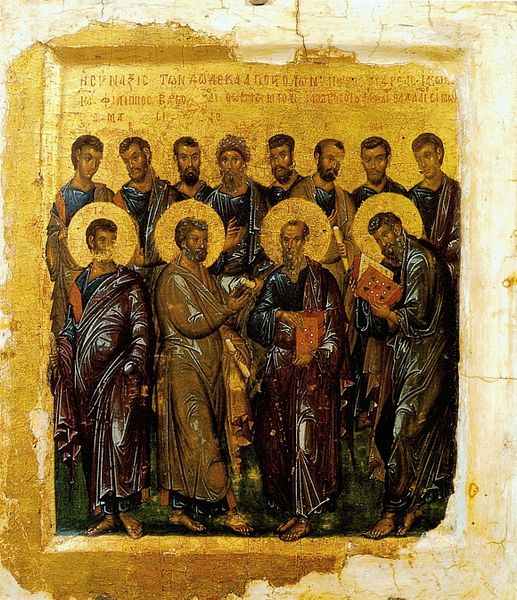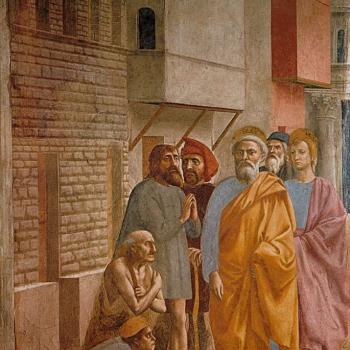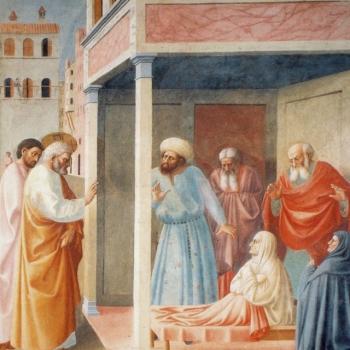
* * *
This is an exchange with a person on the CHNI forum who has a Lutheran background. His words will be in blue.
* * * * *
I have a question about saints and whether they can hear our prayers. What is the logic that they can? The standard answers of “they’re not dead, they are alive in heaven” and such don’t really carry much weight.
I have asked several quite knowledgeable converts and haven’t gotten an answer that makes sense yet to me (and perhaps may have to take it on faith). The best answer I know of comes from Thomas Aquinas, but I wasn’t really satisfied with his answers (although they were pretty dang good nonetheless).
If anyone has any advice on how they overcome this doctrinal hurdle, I’d appreciate it. Remember, I’m not denying that departed saints pray for us. I’m most certain that they do. I’m saying that I don’t see much scriptural or speculative reasoning that supports saints hearing our prayers. Also, the only proof I may end up accepting at the end of the day is “because the Church has always taught that they do.” I may be cool with this answer at some point.
But it would be nice to hear consistent reasoning. Other proofs I would end up accepting are testimonies of people who have prayed to saints and something miraculous happened because of such prayers. If someone could recommend a good book relating such experiences, I’d appreciate it too (this would include Marian related events/experiences as well).
Thanks for your thoughts and your resources. I’ll check them out. I still don’t have a consistent argument for how saints hear our prayers. As you pointed out, I do not doubt that saints are aware of things that are going on in our present reality. The spectators/witnesses word study reference spoke to this fact. And as discussed before, we know that these departed saints are praying for us.
It simply requires a higher level of knowledge than we have presently. One does not have to have all knowledge in order to have the particular knowledge of “hearing” a prayer.
You mentioned that saints are perfected in knowledge (this perhaps could imply the ability to read or hear thoughts). Can this be scripturally proven? If not, I still am not sold on scriptural evidence for departed saints hearing our prayers.
I couldn’t explain all the mechanics of how it works but I know that Scripture says that we will be “like” God in the afterlife:
1 John 3:2 (RSV) Beloved, we are God’s children now; it does not yet appear what we shall be, but we know that when he appears we shall be like him, for we shall see him as he is.
This piece of scripture combined with the Thomas argument in the Summa [that someone else offered] seems to be the most consistent approach. Thank you for pointing out this piece of scripture. It was VERY helpful to understanding the validity of this practice.
Testimony of communication living saints and departed saints seems to be my only avenue. Along with “because it’s what the Church teaches, so love it or leave it:).” If you have some further explanation though, I’m really interested.
Thanks for taking the time with me, Dave. And would love to hear any further thoughts you might have.
You’re very welcome, and I hope this further elaboration of my arguments is helpful to you and others.
The other examples you gave from your papers aren’t as convincing (hey, everyone can’t be Thomas Aquinas! Don’t feel bad:) And most importantly they weren’t convincing to me, but I’m sure that they have been quite effective in apologetics with others. The main point has to do with the “who” and the “what” and the “how.”
Whatever works! In apologetics, pragmatism has a place. Some stuff works in persuading some, other stuff in persuading others. The more arguments we can throw out, I figure, the better chance one will “stick.” And with you, one did! Oftentimes, just one is enough to convince someone.
In all the examples from scripture that you provided (and to me honest others have pointed them out to me too), there is a retort to dispute what you are trying to point out.
And there is usually a counter-reply, too, which is what I’ll attempt to do now. Some of my arguments you have misunderstood a bit, as to their exact nature. We want to be sure to reject the actual arguments that are made. That is why further dialogue or clarification is always a good thing, to make sure everyone is on the same wavelength.
Revelation has saints serving as priests with incense, not necessarily hearing prayers.
It’s not just incense; it is incense as a metaphor for actual prayer (just as in the Mass). But you dichotomize one against the other. I submit that the biblical texts do not do that. In Revelation 5:8, the “twenty-four elders” (usually regarded by commentators as dead human beings) “fell down before the Lamb . . . with golden bowls full of incense, which are the prayers of the saints.” They appear to have other people’s prayers, to present to God. So the obvious question is: what are they doing with them? Why does Revelation present dead saints presenting the prayers of other saints to God?
If they have them, it stands to reason as a rather straightforward deduction, that they heard the initial prayers as well, or at least were granted knowledge of them in some fashion, granted ultimately through the power of God. Revelation 8:3-4 is even more explicit. Rather than equate incense and prayers, it actually distinguishes between them, and presents the scenario that the prayers and incense are presented together:
- And another angel came and stood at the altar with a golden censer; and he was given much incense to mingle with the prayers of all the saints upon the golden altar before the throne; [4] and the smoke of the incense rose with the prayers of the saints from the hand of the angel before God.
So the question, again, is: what is this angel doing with “prayers of the saints” — presenting them to God? It seems clear to me that they have heard the prayers, and are involved as intercessors. Angels are extremely intelligent beings. We know that they rejoice when a sinner repents. They have knowledge in ways that we do not; above our comprehension.
Samuel utilizes a medium to create contact. He did not pray directly.
The argument is more indirect and nuanced than that. In many of these proofs, one element of the practice of intercession of the saints may be present, while another is missing. That is the case here. You asked about how dead saints can hear our prayers. In this instance, Saul went about trying to contact the dead the wrong way: through a medium. But the fact remains that somehow Samuel knew about this (“heard” it) and actually appeared to Saul. He communicated to him.
This shows that there is an awareness and ability to “hear” and to communicate back to a person on the earth. If, on the other hand, God desired no communication whatever between heaven and earth, then this and several other similar incidents (Transfiguration, etc,) simply would not have occurred, since they would have been out of God’s will, and hence, not permitted by Him. So this incident serves as evidence that dead saints can hear petitions from people on earth, and that God permits two-way communication. Protestants often deny both those aspects.
Angels are not departed human beings; they are separate creations, so it isn’t really the same thing.
They are relevant insofar as they, too, are creatures, and not God. Angels are involved in intercession just as dead human beings are. Protestants often oppose the very notion, but they do so against biblical evidence.
The Transfiguration involves Christ speaking with the others. He is God, so this makes sense. We are not.
If God wanted no contact of dead saints with the earth at all, why would he allow Moses and Elijah to appear within sight of men (Matthew 17:3)? It is true that the text doesn’t show Peter or James or John (17:1) speaking to Moses or Elijah, but it doesn’t say they did not do so, either. It is within the realm of possibility. But it demonstrates in any event, that God does not rule out such encounters.
The two witnesses in Revelation 11 (thought by many to be Moses and Elijah again, or Moses and Enoch) do certainly talk to many, since they “prophesy” (11:3) for three-and-a-half years, and give “testimony” (11:7). If they can talk to men, then by cross-referencing similar Scriptures, Moses and Elijah possibly talked to men on the Mount of Transfiguration. We compare the less-clear Scripture with the relatively more clear and explicit.
The same quite possible deduction applies to Matthew 27:52-53:
- the tombs also were opened, and many bodies of the saints who had fallen asleep were raised, [53] and coming out of the tombs after his resurrection they went into the holy city and appeared to many.
It doesn’t say they talked to people, but “appeared” does not rule it out, and, I contend, implies communication, just as Jesus “appeared” after His Resurrection and talked to His disciples (cf. e.g., Mk 16:9, 12, 14; Lk 24:34; Acts 13:31; 1 Cor 15:5-8). Thus, it would be another instance of dead men communicating to those of us on earth, which is consistent with (not an absolute proof of, in all respects) the notion of asking dead saints to pray for us because it shows the possibility of communication between those on earth and dead saints.Luke 16 has two dead people talking to each other. This is different than you or I speaking to a departed saint.
That’s true, but I wasn’t trying to deny the difference in the first place. It is still relevant to this discussion insofar as the rich man was praying to or petitioning Abraham. That is not supposed to happen, according to Protestant categories, since prayer is supposed to go straight to God. That would apply to dead men as well as ones on the earth. Why would they be doing this rather than going to God? He is specifically making a request of Abraham, not merely asking him to pray for him to God (much as Catholics ask the Blessed Virgin Mary to fulfill requests). As I wrote before: “Abraham refuses his requests twice, thus showing that dead men can play a part, in conjunction with God, even in turning down (or by implication, also fulfilling) prayer requests.” That is Catholic thinking; not Protestant.
Note also the element in Luke 16:27-31, where the rich man asks that Lazarus be sent to his brothers, to warn them of his own dire fate. Abraham refuses, but he doesn’t rule out the possibility of a dead man going back to earth. Thus, again, the supposed “wall” between heaven and earth is made a lot less impenetrable than Protestant thought would have it. These are the presuppositions behind the Catholic belief on the communion and intercession of the saints. You seem to be looking for exact correspondence of every aspect of the argument (which is often the Protestant mindset, since explicit biblical proofs are often unreasonably demanded), whereas I am proving different parts of the whole with each example: making a cumulative argument for Catholic practices.
In Acts 9:40 Peter is not praying to the dead woman. The scripture says he is praying AND THEN says Tabitha Arise. Two actions, not one.
Prayer is communication between two beings. If one says that we cannot: 1) talk to a dead person, or 2) that the dead person couldn’t hear us anyway, even if we did, then this passage disproves both things (and both are premises of invocation of the saints). Peter talked to a dead person (Tabitha) and she heard because she followed his “command” and came back to life. Jesus does the same with Lazarus. The fact that Jesus said that His disciples could raise the dead opens up the possibility of many such cases.
Honestly, I don’t think this can be proved Sola Scriptura consistently.
It’s being proved with an inspired Scripture that provides all the necessary root assumptions. These are then reflected upon and fleshed out and developed by Tradition and the Church.
I think the only way this can be proved is through Thomas’ logic and 1 John 3:2. In other words, teaching outside of scripture is necessary to fully grasp and promote the idea. And obviously. The BEST proof as far as I’m concerned is experiential proof provided by testimony.
As I said above, different things persuade different people. I happen to think that all the arguments I provide, taken together, provide pretty strong evidence that the practice is not only not against Scripture, but that it is supported by Scripture in all of its particulars, from the cumulative evidence. It won’t convince everyone, but I still contend that it is a good argument, when all the different aspects of it are considered together.
***
















